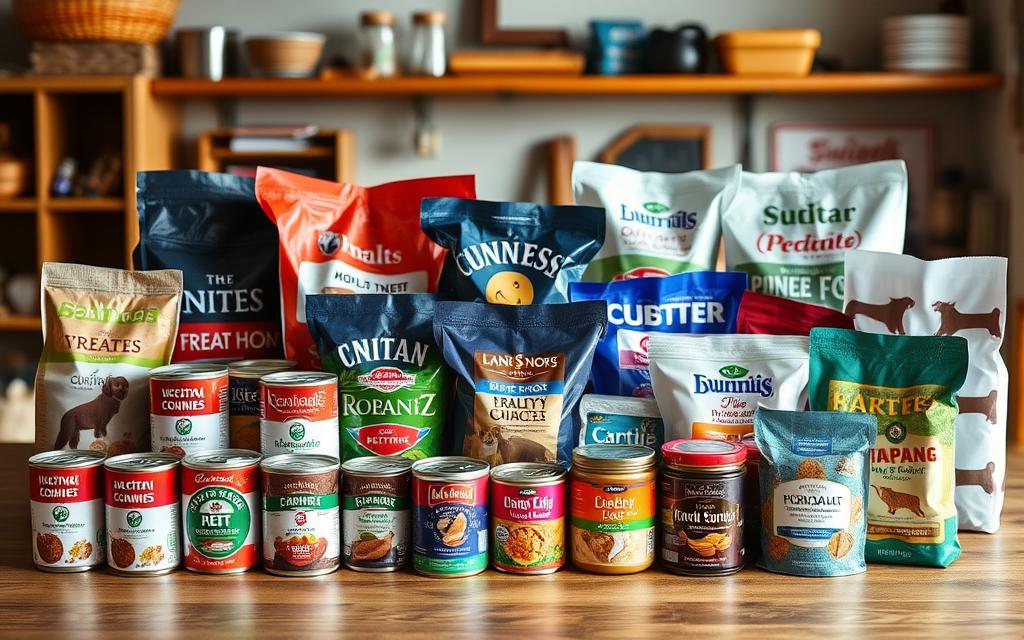Advertisement
Did you know millions of pets in the U.S. are in need of care because their owners can’t afford it? This shows how important local animal groups are. They offer pet food donation and help from pet charity organizations.
Local animal groups are a big help for struggling pet owners. They provide everything from basic supplies to vet care. By reaching out to these groups, you can make sure your pet gets the support they need.
It’s key to know about the resources local animal groups offer. This article will show you how to find and use these services. This way, you and your pet can get the help you both need.
Understanding the Importance of Pet Food Donations
The role of pet food donations is huge. They help pets stay healthy and support local shelters. When people can’t feed their pets, pets may get sick or even be abandoned.

The Impact of Pet Food Shortages
Pet food shortages hurt pets a lot. They can get very sick from not eating right. Sadly, some pets are left at shelters because their owners can’t feed them.
Local animal shelters get overwhelmed with these pets. They try their best but need help.
How Donations Help Local Shelters
Animal shelter donations, like pet food, are very important. They help shelters care for more pets. This means pets get the medical help they need and find new homes.
Donating pet food helps a lot. It shows we care about pets in shelters.
Supporting Community Pet Owners
Pet food donations also help people who can’t afford to feed their pets. They keep pets with their families. This strengthens the bond between pets and their owners.
In short, giving back to animals through pet food donations is very important. It helps both local shelters and community pet owners. By understanding this, we can make our community a better place for pets and their owners.
Types of Pet Food Donations
Donating pet food is a kind way to help pets in need. It’s important to know the different types of donations that are most helpful. Pet food donations can be mainly dry food and wet food, each meeting different needs and preferences of pets.
Dry Food vs. Wet Food Donations
Dry food, or kibble, is a favorite for its convenience and long shelf life. It helps keep teeth clean by reducing tartar. Wet food, on the other hand, is high in moisture, which is good for pets with health issues or those who prefer a tastier diet.
Key differences between dry and wet food donations:
- Dry food is easier to store and lasts longer.
- Wet food is better for pets with urinary problems or those who need more water.
Specialty Diet Needs for Pets
Some pets need special diets due to allergies, sensitivities, or health issues. Donations of specialty pet food, like grain-free, hypoallergenic, or prescription diets, are very valuable. These foods are essential for pets with specific health needs, making them highly sought after by shelters and pet owners.
| Type of Specialty Food | Benefit |
|---|---|
| Grain-free | Suitable for pets with grain allergies or sensitivities. |
| Hypoallergenic | Ideal for pets with skin allergies or sensitivities. |
| Prescription diets | Formulated for pets with specific medical conditions, such as kidney disease or obesity. |
Other Helpful Pet Supplies
Donations of toys, bedding, grooming tools, and leashes can also greatly support pet care. These items help keep pets happy, comfortable, and clean, making their stay in shelters better.
Examples of other helpful pet supplies include:
- Toys: Interactive toys or plush toys for mental stimulation.
- Bedding: Comfortable beds or blankets for warmth and coziness.
- Grooming tools: Brushes, nail clippers, and shampoos for hygiene and grooming.
Finding Local Animal Groups
Helping animals in need starts with finding local groups. Many communities have groups dedicated to pets and their owners.
Looking for these groups can be done in several ways. One good method is to research nonprofit organizations in your area. These groups are often eligible for donations because they are nonprofits.
Researching Nonprofit Organizations
Start by researching groups with a good reputation. Websites like GuideStar or Charity Navigator can help you find rated organizations in your area. This way, you know your donations are going to a trustworthy place.
Utilizing Social Media and Online Platforms
Social media is key in today’s world for finding local animal groups. Facebook, Twitter, and Instagram are great for animal shelters and rescue groups to share their work. You can search and follow these groups to stay informed.
Online platforms focused on pet care and animal welfare are also helpful. Websites and forums for pet owners can give you insights into local groups needing support, like pet food drives.
Getting Recommendations from Veterinarians
Vets often know about local animal groups. They can recommend shelters or rescue organizations that need help. Asking your vet for suggestions can lead you to reliable groups.
By using these methods, you can find local animal groups making a difference. Your support, whether through donations, volunteering, or spreading the word, can greatly help pets in need.
Organizing a Pet Food Donation Drive
Organizing a pet food donation drive is a great way to help your community. It supports local animal shelters and brings people together. It’s a way to show kindness and make a difference.
Setting Goals and Objectives
First, you need to know what you want to achieve. Decide what kind of pet food is needed, how much, and for how long. Also, figure out who you want to ask for donations.
- Identify the specific needs of local shelters and pet owners.
- Set a realistic target for the amount of pet food to be collected.
- Establish a timeline for the donation drive.
Partnering with Local Businesses
Working with local businesses can really help your drive succeed. They can offer places to drop off donations, help spread the word, and provide volunteers.
| Business Type | Potential Contribution |
|---|---|
| Pet Stores | Donation drop-off points, discounts on pet food |
| Veterinary Clinics | Promotional materials, volunteer staff |
| Local Restaurants | Fundraising events, promotional support |
Promoting the Drive Effectively
Getting the word out is crucial. Use social media, local newspapers, and community boards to reach more people.
Make your messages interesting and use pictures that grab attention. Say thank you to those who donate. Show them how their help makes a difference.
Volunteering with Animal Organizations
Volunteering is key to helping animal welfare groups. It makes a big difference in the lives of pets and their owners. By giving your time, you can help a lot.
Advantages of Donating Your Time
Helping out with local animal groups has many benefits. You get to do daily tasks and help with events. Plus, you meet people who care about animals just like you.
Some key benefits include:
- Gaining a deeper understanding of the challenges faced by animal shelters
- Developing new skills through various volunteer roles
- Building connections within the community
Roles and Responsibilities
Volunteers are crucial to animal shelters. They help with adoptions and fundraising events. Their work is vital.
| Role | Description |
|---|---|
| Adoption Assistant | Helps potential adopters find the right pet and facilitates the adoption process. |
| Fundraising Coordinator | Assists in organizing and executing fundraising events to support the shelter. |
| Animal Care Volunteer | Provides daily care to animals, including feeding, walking, and providing social interaction. |
Connecting with Fellow Animal Lovers
Volunteering lets you meet others who love animals. This community offers support and knowledge. Together, you can make a big difference.
“Volunteering is not just about giving back; it’s also about building a community that cares.”
Sponsoring Local Pet Events
Supporting local pet events is a great way to help animals and bring people together. By joining or sponsoring these events, you can really make a difference. It helps pets and their owners in big ways.
Types of Pet Events to Sponsor
There are many pet events you can sponsor, like adoption fairs, pet supply drives, and workshops. Adoption fairs help pets find homes. Pet supply drives gather items for animals in need.
Workshops teach pet owners about caring for their pets. These events support animals and build a community of pet lovers.
How Sponsorship Can Increase Donations
Sponsoring pet events boosts donations to animal shelters. When you sponsor, you draw more people to the event. This means more donations for animals.
It also inspires others to give, showing they care about local animal welfare. This can lead to a big increase in donations for pets.
Engaging the Community through Events
Pet events are a chance to connect with the community and support animals. By sponsoring or taking part, you show your dedication to helping animals. It’s a way to give back.
These events also raise awareness about pet adoption, health, and responsible pet care. This makes our community more caring and supportive of pets and their owners.
Creating Awareness about Pet Food Needs
To help pets in need, we must spread the word about the need for pet food donations. By teaching the community about the struggles pet owners face, we can inspire more people to help. This way, we can make a real difference.
Utilizing Local Media Outlets
Using local media is a great way to get the word out. We can contact newspapers, radio stations, and TV stations to share stories of pet food needs. These stories show how donations help animals and their owners.
Key strategies for using local media include:
- Writing a compelling press release for local media
- Building connections with local journalists
- Sharing stories of pets helped by donations
Sharing Success Stories on Social Media
Social media is a powerful tool for spreading the word. By sharing success stories and the impact of donations, we can engage more people. Facebook, Twitter, and Instagram are great for sharing updates and photos.
Tips for effective social media engagement include:
- Posting updates about pet food needs
- Using hashtags to reach more people
- Sharing photos and videos of pets helped by donations
Engaging the Community through Workshops
Hosting workshops and community events is another good way to raise awareness. These events can teach people about the importance of pet food donations and how to help.
| Event Type | Description | Benefits |
|---|---|---|
| Pet Care Workshops | Educational sessions on pet care and nutrition | Educates pet owners, promotes donations |
| Fundraising Events | Events to raise funds for pet food donations | Raises funds, increases awareness |
| Adoption Fairs | Events for adopting pets and learning about care | Promotes adoption, raises awareness about pet food needs |
By using these strategies, we can effectively raise awareness about pet food needs. This encourages the community to support local animal shelters and pet owners.
Building Relationships with Animal Groups
It’s key to build strong ties with local animal groups for pet charity success. This way, people and groups can tackle community needs together. They can offer real help to those in need.
Following Up on Donations
After giving to a local shelter, it’s important to check in. This builds trust and shows you care about the shelter’s needs. As Jane Smith, Director of a pet charity organization, said, “The key to successful pet charity initiatives lies in the relationships we build and the follow-ups we conduct.“
Checking in means seeing how your donation is used. It could be for food, vet bills, or other needs. This ensures your help is making a real difference.
Staying in Touch with Local Shelters
Keeping in regular contact with shelters is crucial. It lets donors know about the shelter’s progress and needs. This helps find where more help is needed.
Updates also build a sense of community. They connect donors, shelters, and pets. As
“The love and care for animals bring people together in ways that transcend differences, creating a community that is both supportive and resilient.”
Collaborating on Future Initiatives
Working together with animal groups on new projects is powerful. It combines resources and skills for bigger impacts. This way, we can support pets better.
- Identify common goals and objectives
- Develop strategies that leverage the strengths of all parties involved
- Implement programs that are tailored to the specific needs of the community
By teaming up and staying committed, we can make a bigger difference. Donating is just the start. Building lasting bonds with animal groups is where the real change happens.
Tax Benefits of Donating to Animal Charities
Donating to animal charities is not just good for animals; it also helps your wallet. When you give to a pet food drive or make animal shelter donations, you help a great cause and might lower your taxes.
Donating to animal charities can lower your taxable income. This is great for those who itemize their deductions. Knowing what you can deduct is key to getting the most tax benefits.
Understanding Deductible Expenses
It’s important to know what you can deduct when donating. Cash donations are usually deductible, but your time or services aren’t. If you donate goods, like pet food, you need to figure out their value.
For example, if you’re running a pet food drive, you can deduct the cost of food and other expenses. Keeping records of your donations is crucial for claiming these deductions.
Keeping Accurate Records
Keeping good records of your donations is key for taxes. This includes receipts, bank statements, and any letters from the charity. For donations over $250, you need a letter from the charity to claim your deduction.
It’s wise to document the condition and value of donated goods. For expensive items, getting an appraisal can help support your deduction claim.
Resources for Tax Information
For more on tax deductions and charitable giving, check the IRS website. You can also talk to a tax expert to make sure you’re getting all the deductions you can for your animal shelter donations.
Many animal charities also offer tips on their websites for making deductible donations. By staying informed and organized, you can help animals and save on taxes.
Encouraging Others to Donate
Starting a chain of kindness for animals in need begins with inspiring others. By talking about the value of pet food donations, we can motivate our communities. This helps animals in need.
Spreading Awareness about Pet Care
Talking about pet care and the challenges pet owners face can raise awareness. This can be done through social media, community events, or sharing personal stories. It encourages others to help animals in need.
Sharing Compelling Content
Creating content that shows the impact of donations can inspire others to give. Using social media and online communities can spread the message. This encourages more people to help animals.
Involving the Next Generation
Getting schools and youth groups involved in pet food drives helps young people. It teaches them compassion and responsibility. This benefits animals and builds a more caring community.
Together, we can make a big difference in the lives of pets and their owners. This creates a more caring and supportive community for everyone.



